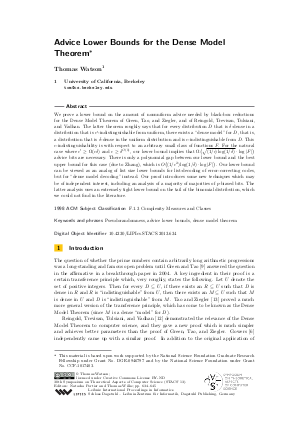Advice Lower Bounds for the Dense Model Theorem
Author Thomas Watson
-
Part of:
Volume:
30th International Symposium on Theoretical Aspects of Computer Science (STACS 2013)
Part of: Series: Leibniz International Proceedings in Informatics (LIPIcs)
Part of: Conference: Symposium on Theoretical Aspects of Computer Science (STACS) - License:
 Creative Commons Attribution-NoDerivs 3.0 Unported license
Creative Commons Attribution-NoDerivs 3.0 Unported license
- Publication Date: 2013-02-26
File

PDF
LIPIcs.STACS.2013.634.pdf
- Filesize: 0.58 MB
- 12 pages
Document Identifiers
Subject Classification
Keywords
- Pseudorandomness
- advice lower bounds
- dense model theorem
Metrics
- Access Statistics
-
Total Accesses (updated on a weekly basis)
0PDF Downloads0Metadata Views
Abstract
We prove a lower bound on the amount of nonuniform advice needed by black-box reductions for the Dense Model Theorem of Green, Tao, and Ziegler, and of Reingold, Trevisan, Tulsiani, and Vadhan. The latter theorem roughly says that for every distribution D that is delta-dense in a distribution that is epsilon'-indistinguishable from uniform, there exists a "dense model" for D, that is, a distribution that is delta-dense in the uniform distribution and is epsilon-indistinguishable from D. This epsilon-indistinguishability is with respect to an arbitrary small class of functions F. For the natural case where epsilon' >= Omega(epsilon delta) and epsilon >= delta^{O(1)}, our lower bound implies that Omega(sqrt{(1/epsilon)log(1/delta)} log|F|) advice bits are necessary. There is only a polynomial gap between our lower bound and the best upper bound for this case (due to Zhang), which is O((1/epsilon^2)log(1/delta) log|F|). Our lower bound can be viewed as an analog of list size lower bounds for list-decoding of error-correcting codes, but for "dense model decoding" instead. Our proof introduces some new techniques which may be of independent interest, including an analysis of a majority of majorities of p-biased bits. The latter analysis uses an extremely tight lower bound on the tail of the binomial distribution, which we could not find in the literature.
Cite As Get BibTex
Thomas Watson. Advice Lower Bounds for the Dense Model Theorem. In 30th International Symposium on Theoretical Aspects of Computer Science (STACS 2013). Leibniz International Proceedings in Informatics (LIPIcs), Volume 20, pp. 634-645, Schloss Dagstuhl – Leibniz-Zentrum für Informatik (2013)
https://doi.org/10.4230/LIPIcs.STACS.2013.634
BibTex
@InProceedings{watson:LIPIcs.STACS.2013.634,
author = {Watson, Thomas},
title = {{Advice Lower Bounds for the Dense Model Theorem}},
booktitle = {30th International Symposium on Theoretical Aspects of Computer Science (STACS 2013)},
pages = {634--645},
series = {Leibniz International Proceedings in Informatics (LIPIcs)},
ISBN = {978-3-939897-50-7},
ISSN = {1868-8969},
year = {2013},
volume = {20},
editor = {Portier, Natacha and Wilke, Thomas},
publisher = {Schloss Dagstuhl -- Leibniz-Zentrum f{\"u}r Informatik},
address = {Dagstuhl, Germany},
URL = {https://drops.dagstuhl.de/entities/document/10.4230/LIPIcs.STACS.2013.634},
URN = {urn:nbn:de:0030-drops-39717},
doi = {10.4230/LIPIcs.STACS.2013.634},
annote = {Keywords: Pseudorandomness, advice lower bounds, dense model theorem}
}
